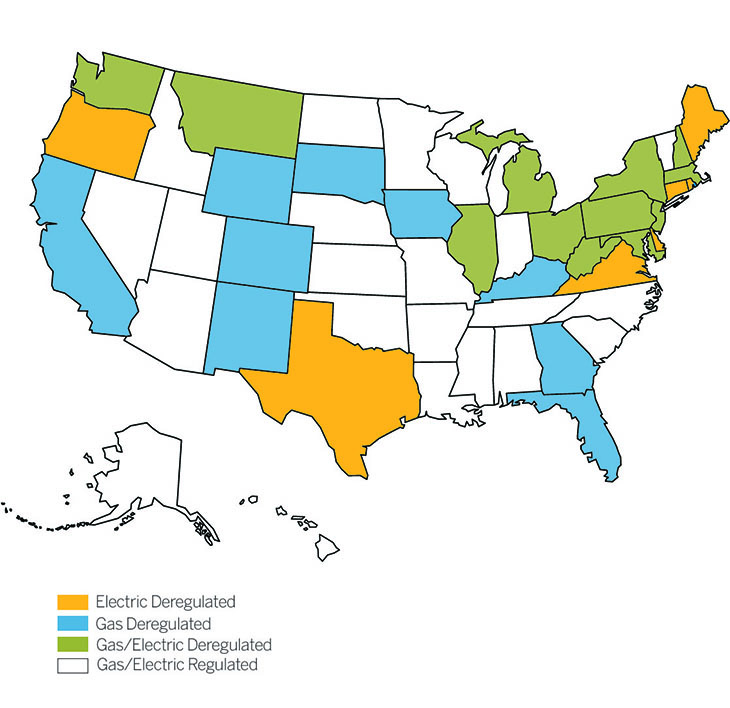Energy Regulation in the U.S.

At Spark, we proudly provide energy services to states that enjoy deregulated gas and electricity. Deregulation is the removal or simplification of government rules and regulations that constrain the operation of market forces.
The push for deregulation of natural gas and electricity happened when the Federal Energy Regulation Commission (FERC) decided it should limit its authority to wholesale transactions. This move cleared the way for individual states to determine if and how they should allow retail price competition.
Deregulation does not mean the elimination of laws against fraud but eliminates or reducing government control of how business is done, thereby moving toward a more free market.
This means that you can choose the gas and electricity that comes to your home or business.
States with Deregulated Electricity
Here’s a closer look at which states have deregulated electricity, with notes for those that may have limitations. Keep in mind that no state has an energy market that is completely deregulated. The closest state is Texas with approximately 85% of the state having access to energy choice.
Of the 18 states that enjoy some level of deregulation, Spark and its family of brands (which include VerdeEnergy, Provider Power, and Major Energy) have access to the majority of them. Click each link to learn more about Spark electricity services offered in that state.
State |
Year Deregulated |
Notes |
|---|---|---|
| California | *California’s electric choice works on a very limited lottery system called DirectAccess. | |
| Connecticut | 1998 | |
| Maine | 2000 | |
| Maryland | 1999 | |
| New Hampshire | 1998 | |
| Illinois | 1997 | |
| Massachusetts | 1998 | |
| Michigan | 1998 | |
| New Jersey | 1999 | |
| New York | 1997 | |
| Ohio | 1996 | |
| Pennsylvania | 1996 | |
| Rhode Island | 1996 | Both Natural Gas and Electric Choice programs are limited for residential consumers. |
| Washington DC | 2001 | |
| Delaware | 1999 | |
| Oregon | 1997 | |
| Texas | 2002 |
States with Deregulated Natural Gas
Here’s a closer look at which states enjoy natural gas deregulation, with notes for those that may have limitations. Keep in mind that no state has an energy market that is completely deregulated. The closest state is Texas with approximately 85% of the state having access to energy choice.
Of the 27 states that enjoy deregulation, Spark and its family of brands (which include Verde Energy, Provider Power, and Major Energy) have access to the majority of them. Click through each link to learn more about Spark’s services in that state.
State |
Year Deregulated |
Comments |
|---|---|---|
| Connecticut | 1996 | Gas choice is partial and very limited. |
| Maine | 1998 | Natural Gas Choice underwent more of a ‘restructuring’ process. It is only available to Industrial and Commercial consumers. |
| Maryland | 1995 | Some residential, commercial and industrial customers in some areas of Maryland are not eligible for Natural Gas Choice. |
| New Hampshire | 1998 | New Hampshire does not offer Natural Gas Choice to residential customers at this time. |
| Iowa | 1997 | Natural Gas Choice is only available to a small number of consumers. |
| California | 1995 | California’s electric choice works on a very limited lottery system called DirectAccess. |
| Illinois | 2002 | Approximately 75% of the state of Illinois is eligible for Natural Gas Choice. |
| Massachusetts | 1998 | |
| Michigan | 2008 | |
| New Jersey | 1999 | |
| New York | 1999 | |
| Ohio | 1997 | |
| Pennsylvania | 1999 | |
| Rhode Island | 1996 | |
| Virginia | 2001 | Both Natural Gas and Electric Choice programs are limited for residential consumers. |
| Washington DC | 1999 | |
| Colorado | 1999 | Colorado is Natural Gas Deregulated, however no utilities currently offer choice programs. |
| Florida | 2002 | |
| Georgia | 1998 | |
| Indiana | 1998 | Natural Gas Choice is only available for NIPSCO customers. |
| Kentucky | 2000 | |
| Montana | 1986 | |
| Nebraska | 1998 | |
| New Mexico | 1980s | |
| South Dakota | 2005 | |
| West Virginia | 2010 | |
| Wyoming | 1996 | Wyoming Choice Gas program allows consumers to select or switch their supplier during a specific defined period through Source Gas Utility. |
States with Regulated Electricity
Here’s a closer look at which states do not enjoy electricity deregulation, along with notes for some states that may be working on deregulation.
| Alabama Alaska Arizona Arkansas Hawaii Idaho Kansas Louisiana Minnesota Mississippi Missouri |
Nevada North Carolina North Dakota Oklahoma South Carolina Tennessee Utah Vermont Washington Wisconsin Colorado |
Florida Georgia Indiana Kentucky Montana Nebraska New Mexico South Dakota West Virginia Wyoming Iowa |
- Arizona: In 2004, energy regulation was placed on hold due to various regulatory order
- Arkansas: In 2003, Bill 1114 was signed to reverse energy deregulation
- Nevada: Currently campaigning to adopt energy deregulation. The status of this state could change in the near future.
- Oklahoma: In 2001, Senate Bill 440 was signed for further investigation and study of the impacts of energy deregulation.
States with Natural Gas Regulations
Here’s a closer look at which states do not enjoy electricity deregulation, along with notes for some states that may be working on deregulation.
| Oregon Texas Alabama Alaska Arizona Arkansas Hawaii Idaho |
Kansas Louisiana Minnesota Mississippi Missouri Nevada North Carolina North Dakota |
Oklahoma South Carolina Tennessee Utah Vermont Washington Delaware Wisconsin |
- Arizona: In 2004, energy regulation was placed on hold due to various regulatory order
- Arkansas: In 2003, Bill 1114 was signed to reverse energy deregulation
- Nevada: Currently campaigning to adopt energy deregulation. The status of this state could change in the near future.
- Oklahoma: In 2001, Senate Bill 440 was signed for further investigation and study of the impacts of energy deregulation.
- Delaware: Gas choice was trialed and discontinued.
- Wisconsin: Natural Gas Choice program was discontinued in 2001.
How Does a State Decide to Deregulate?
Investor-owned utilities (private companies with ownership shares held by stockholders, like Spark) serve the majority of electricity and natural gas customers in the United States. These utilities are primarily regulated at the state level, where public service commissions (PSCs) are responsible for overseeing and authorizing investment decisions, operations and customer rates.
State regulators of investor-owned utilities (and their counterparts for publicly-owned utilities) are clearly in positions where their decisions and policies strongly influence utility investments and operations. They have a prominent role in establishing regulations and policies that support the establishment and implementation of utility-sector energy efficiency programs. PSCs in some states pioneered regulations and policies that led to the development and practice of utility “demand-side management,” which includes customer energy efficiency programs.
State policymakers and regulators provide clear direction to regulated utilities about the importance of energy efficiency. As a first step, legislators and regulators typically require utilities to offer programs; they also set up mechanisms for utilities to recover their costs through rate case proceedings. A recent trend has been for states to establish specific energy savings targets (typically as a percentage of total energy sales) for regulated utilities. These energy efficiency resource standards (EERS) are in place in a large and rapidly growing number of states.
For more information about how energy deregulation affects you, visit our website.



